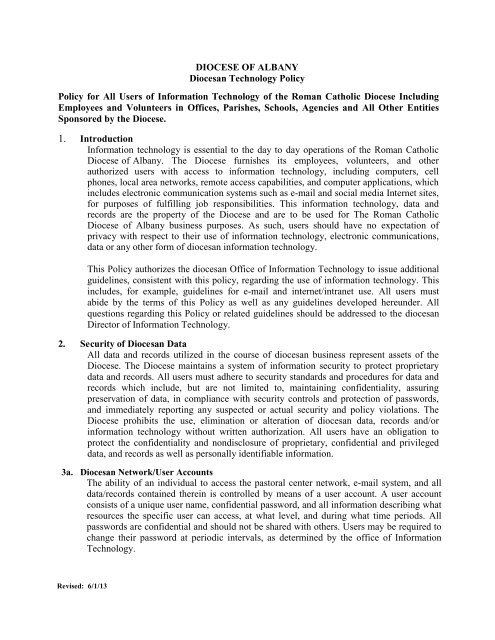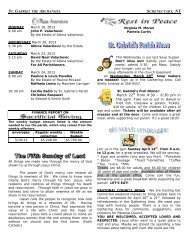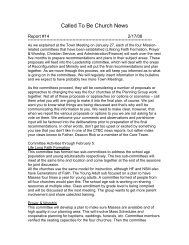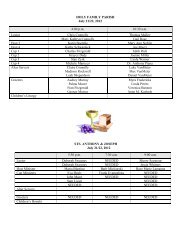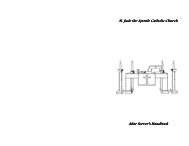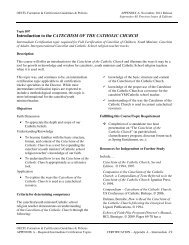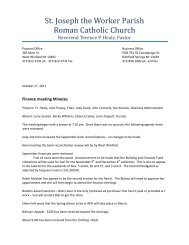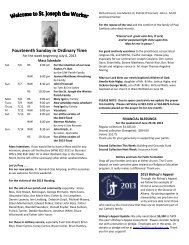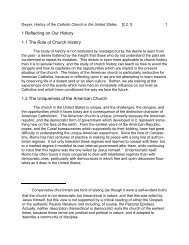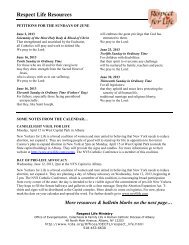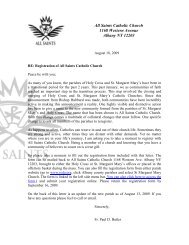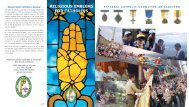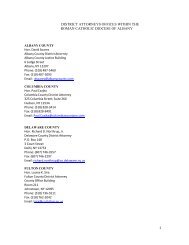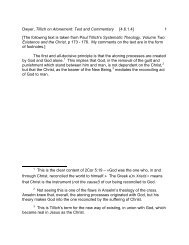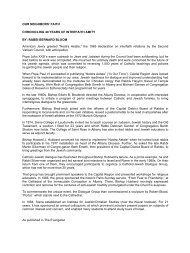Technology Policy - Roman Catholic Diocese of Albany
Technology Policy - Roman Catholic Diocese of Albany
Technology Policy - Roman Catholic Diocese of Albany
Create successful ePaper yourself
Turn your PDF publications into a flip-book with our unique Google optimized e-Paper software.
DIOCESE OF ALBANY<br />
Diocesan <strong>Technology</strong> <strong>Policy</strong><br />
<strong>Policy</strong> for All Users <strong>of</strong> Information <strong>Technology</strong> <strong>of</strong> the <strong>Roman</strong> <strong>Catholic</strong> <strong>Diocese</strong> Including<br />
Employees and Volunteers in Offices, Parishes, Schools, Agencies and All Other Entities<br />
Sponsored by the <strong>Diocese</strong>.<br />
1. Introduction<br />
Information technology is essential to the day to day operations <strong>of</strong> the <strong>Roman</strong> <strong>Catholic</strong><br />
<strong>Diocese</strong> <strong>of</strong> <strong>Albany</strong>. The <strong>Diocese</strong> furnishes its employees, volunteers, and other<br />
authorized users with access to information technology, including computers, cell<br />
phones, local area networks, remote access capabilities, and computer applications, which<br />
includes electronic communication systems such as e-mail and social media Internet sites,<br />
for purposes <strong>of</strong> fulfilling job responsibilities. This information technology, data and<br />
records are the property <strong>of</strong> the <strong>Diocese</strong> and are to be used for The <strong>Roman</strong> <strong>Catholic</strong><br />
<strong>Diocese</strong> <strong>of</strong> <strong>Albany</strong> business purposes. As such, users should have no expectation <strong>of</strong><br />
privacy with respect to their use <strong>of</strong> information technology, electronic communications,<br />
data or any other form <strong>of</strong> diocesan information technology.<br />
This <strong>Policy</strong> authorizes the diocesan Office <strong>of</strong> Information <strong>Technology</strong> to issue additional<br />
guidelines, consistent with this policy, regarding the use <strong>of</strong> information technology. This<br />
includes, for example, guidelines for e-mail and internet/intranet use. All users must<br />
abide by the terms <strong>of</strong> this <strong>Policy</strong> as well as any guidelines developed hereunder. All<br />
questions regarding this <strong>Policy</strong> or related guidelines should be addressed to the diocesan<br />
Director <strong>of</strong> Information <strong>Technology</strong>.<br />
2. Security <strong>of</strong> Diocesan Data<br />
All data and records utilized in the course <strong>of</strong> diocesan business represent assets <strong>of</strong> the<br />
<strong>Diocese</strong>. The <strong>Diocese</strong> maintains a system <strong>of</strong> information security to protect proprietary<br />
data and records. All users must adhere to security standards and procedures for data and<br />
records which include, but are not limited to, maintaining confidentiality, assuring<br />
preservation <strong>of</strong> data, in compliance with security controls and protection <strong>of</strong> passwords,<br />
and immediately reporting any suspected or actual security and policy violations. The<br />
<strong>Diocese</strong> prohibits the use, elimination or alteration <strong>of</strong> diocesan data, records and/or<br />
information technology without written authorization. All users have an obligation to<br />
protect the confidentiality and nondisclosure <strong>of</strong> proprietary, confidential and privileged<br />
data, and records as well as personally identifiable information.<br />
3a. Diocesan Network/User Accounts<br />
The ability <strong>of</strong> an individual to access the pastoral center network, e-mail system, and all<br />
data/records contained therein is controlled by means <strong>of</strong> a user account. A user account<br />
consists <strong>of</strong> a unique user name, confidential password, and all information describing what<br />
resources the specific user can access, at what level, and during what time periods. All<br />
passwords are confidential and should not be shared with others. Users may be required to<br />
change their password at periodic intervals, as determined by the <strong>of</strong>fice <strong>of</strong> Information<br />
<strong>Technology</strong>.<br />
Revised: 6/1/13
3b. Wireless Network/User Accounts<br />
To gain access to the WIFI Network you must have a user account. For convenience, use<br />
the same (user name and password) credentials to gain access to both the Diocesan and the<br />
WIFI networks.<br />
WIFI is permitted ONLY in these designated areas <strong>of</strong> the Pastoral Center building:<br />
<br />
<br />
<br />
Conference rooms on each floor <strong>of</strong> the North and South buildings. At<br />
director/department head discretion.<br />
Conference rooms 1 thru 7 on the first floor <strong>of</strong> the South building. Scheduled<br />
meetings, conferences and training purposes.<br />
Pastoral Center Cafeteria. Available lunchtime to all employees with user accounts.<br />
Revised: 6/1/13<br />
By Request, Guest User accounts may be created by the IT Office for business purposes<br />
only.<br />
4. Computer Viruses<br />
Computer viruses pose a serious threat to the integrity <strong>of</strong> both the Information<br />
<strong>Technology</strong> and data/records assets <strong>of</strong> the <strong>Diocese</strong>. All users should take every<br />
reasonable precaution to ensure that downloaded or e-mailed files are virus free.<br />
Reasonable precautions would include, for instance, contacting the Office <strong>of</strong> Information<br />
<strong>Technology</strong> upon receipt <strong>of</strong> a suspicious e-mail and refraining from opening attachments<br />
<strong>of</strong> a suspicious e-mail.<br />
Users must obtain the permission <strong>of</strong> their department head before using a flash drive or<br />
similar device in conjunction with diocesan information technology. The department<br />
head must first consult with the Director <strong>of</strong> Information <strong>Technology</strong> before granting such<br />
permission.<br />
5. Internet Use/Prohibited Communications<br />
The <strong>Diocese</strong> strictly prohibits any use <strong>of</strong> electronic communications that violates<br />
diocesan policy, New York State and Federal law. Users may not utilize diocesan<br />
information technology in any way deemed fraudulent, sexually explicit, pr<strong>of</strong>ane,<br />
obscene, intimidating, defamatory or otherwise unlawful or inappropriate. Examples <strong>of</strong><br />
forbidden use include distribution <strong>of</strong> sexually explicit messages/pictures, cartoons or<br />
jokes, propositions or love letters, ethnic or racial slurs, any messages that can be<br />
construed to be harassing or disparaging <strong>of</strong> others based on their sex, race, sexual<br />
orientation, age, national origin, religious beliefs or other legally protected status.<br />
Electronic communication may not be used for chain mailing or to conduct political<br />
campaigning activities. Users may not utilize diocesan/parish property to participate in or<br />
intervene in any partisan political campaign on behalf <strong>of</strong> any candidate for public <strong>of</strong>fice.<br />
This includes publishing or distributing electronic communication that may be construed<br />
as a campaigning activity. Users shall not utilize diocesan information technology to<br />
communicate with children or minors for the purpose <strong>of</strong> disseminating inappropriate<br />
communications, as set forth above, or promoting inappropriate relationships.<br />
The <strong>Diocese</strong> encourages the exploration and research on the World Wide Web for<br />
business related or pr<strong>of</strong>essional activities. Users should not “browse the web” during
work time to access sites and communications unrelated to business or pr<strong>of</strong>essional<br />
activities. The diocese reserves the right to monitor and record all Internet activity, and<br />
to conduct random audits <strong>of</strong> Internet use.<br />
6. Copyright/Approval and Installation <strong>of</strong> S<strong>of</strong>tware used on Diocesan Systems<br />
Copyright is a term used to describe the legal rights people have to protect original work<br />
they have created. Original work can include, for example, a computer program,<br />
document, graphic, film or sound recording. Copyright ensures that no one else can copy,<br />
alter or use the work without the express permission <strong>of</strong> the owner. Copyright is<br />
sometimes indicated in a piece <strong>of</strong> work by this symbol ©. However, it does not have to<br />
be displayed under British law. So a lack <strong>of</strong> the symbol does not necessarily indicate a<br />
lack <strong>of</strong> copyright.<br />
Federal Copyright Act protects most computer s<strong>of</strong>tware. In accordance with these laws,<br />
Diocesan users are prohibited from making and installing illegal copies <strong>of</strong> s<strong>of</strong>tware. All<br />
s<strong>of</strong>tware used on Diocesan computer systems must be approved and installed by the<br />
Office <strong>of</strong> Information <strong>Technology</strong>. All questions and clarifications regarding copyright<br />
issues should be directed to the diocesan Office <strong>of</strong> Information <strong>Technology</strong>.<br />
7. Interruption <strong>of</strong> User Internet Connections<br />
The Office <strong>of</strong> Information <strong>Technology</strong> performs periodic maintenance on the diocesan<br />
network in order to preserve the integrity <strong>of</strong> security systems. As a result, user internet<br />
connections may be interrupted at any time and without warning if conditions warrant.<br />
8. Right <strong>of</strong> inspection<br />
The <strong>Roman</strong> <strong>Catholic</strong> <strong>Diocese</strong> <strong>of</strong> <strong>Albany</strong> reserves the unqualified right to inspect and<br />
examine any Diocesan owned or operated communications system, computing resource<br />
and/or files or information, including computers, cell phones, listservs, networks,<br />
applications, and electronic communications, including e-mail, contained therein at any<br />
time. Users possess no privacy right to any data, information or documents received or<br />
disseminated on the network or through e-mail. By utilizing these diocesan systems, users<br />
consent to the <strong>Diocese</strong>’s right to inspect and examine all data, information, documents<br />
and e-mail. When a user acts inappropriately through the technology system, the <strong>Diocese</strong><br />
reserves the right to report such actions to any outside authorities and/or take appropriate<br />
internal diocesan disciplinary action.<br />
When sources outside the <strong>Diocese</strong> request an inspection and/or examination <strong>of</strong> any<br />
Diocesan owned or operated technology system, computing resource and/or files or<br />
information contained therein, the <strong>Diocese</strong> will treat the information as confidential<br />
unless any one or more <strong>of</strong> the following conditions exist: When approved by the<br />
appropriate Diocesan <strong>of</strong>ficial(s); when authorized by the owner(s) <strong>of</strong> information; when<br />
required by federal, state or local law; or when required by a valid subpoena or court<br />
order.<br />
Note: When notice is required to be provided by law, court order or subpoena, users will<br />
be notified accordingly.<br />
Revised: 6/1/13
9. Compliance<br />
These policies apply to diocesan Information <strong>Technology</strong> and to all users <strong>of</strong> diocesan<br />
Information <strong>Technology</strong> regardless <strong>of</strong> personal or employment relationship to the<br />
<strong>Diocese</strong>. Use <strong>of</strong> these resources constitutes acceptance <strong>of</strong> these policies. Violations <strong>of</strong><br />
these policies may result in actions ranging from denial <strong>of</strong> access to diocesan technology<br />
resources to termination <strong>of</strong> employment or refusal or withdrawal <strong>of</strong> volunteer status.<br />
Illegal use <strong>of</strong> computers and information technology shall be reported to pertinent law<br />
enforcement agencies.<br />
Revised: 6/1/13
Review and Acceptance<br />
In order to ensure all users are aware <strong>of</strong> their obligations under this acceptable use policy, all<br />
users are required to review and accept this policy.<br />
As an employee <strong>of</strong> the <strong>Roman</strong> <strong>Catholic</strong> <strong>Diocese</strong> <strong>of</strong> <strong>Albany</strong> or as an authorized user <strong>of</strong> the<br />
diocesan information technology, I have received and read the attached <strong>Technology</strong> <strong>Policy</strong>,<br />
understand and agree with the obligation <strong>of</strong> adhering to the regulations and guidelines contained<br />
herein.<br />
Name<br />
Signature<br />
Date<br />
Affiliation<br />
Department, Parish, School or Office<br />
Any and all questions regarding this policy should be directed to the Director <strong>of</strong> Information<br />
<strong>Technology</strong> at (518) 453-6685.<br />
Revised: 6/1/13


